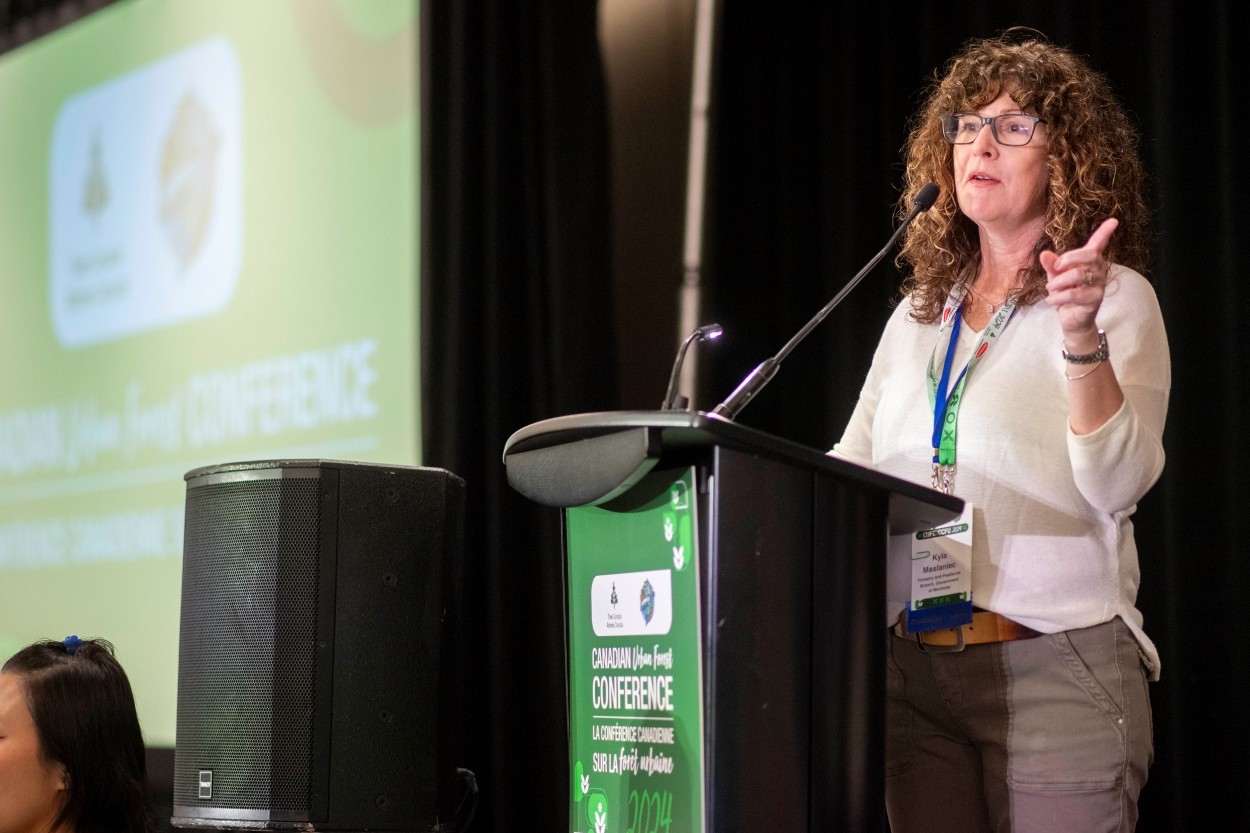The 2024 Canadian Urban Forest Conference (CUFC) took place from October 15 to 18 in Winnipeg, Manitoba, bringing together urban forestry researchers, professionals, municipalities, and community groups from across Canada. With the theme, “Trees for All: Equity in Canada’s Urban Forests,” the conference emphasized the importance of equitable access to the benefits provided by urban trees, forests, and green spaces. Over 350 delegates came together to explore innovative strategies, technologies, research, and management practices aimed at promoting equitable access to urban forestry benefits.
A Homecoming for CUFC in Manitoba
As the new Prairies Region representative for the Canadian Urban Forest Network and one of the conference organizers, I was proud to welcome CUFC back to Manitoba. The first-ever CUFC was held in Winnipeg in 1993, making last year’s event a meaningful homecoming. Winnipeg, situated at the confluence of the Red and Assiniboine rivers, has been a gathering place for trade and knowledge sharing for over 6,000 years. Its central location in North America and rich history of knowledge sharing provided a fitting backdrop for discussions on equity and collaboration in urban forestry.

Kyla Maslaniec speaking at the Canadian Urban Forest Conference in Winnipeg | October 2024
Winnipeg’s urban forest is renowned for housing the largest urban elm population in North America, maintained through a highly effective Dutch elm disease (DED) management program. This program has long been the cornerstone of Manitoba’s urban forestry efforts, supporting communities across the province. The conference highlighted how Manitoba continues to adapt and innovate, demonstrating resilience and leadership in urban forest management.
The Importance of Climate and Equity in Urban Forestry
One of the most impactful moments for me was the CUFN Prairies Region Workshop, a pre-conference event organized with the Manitoba Urban Forest Council. The workshop addressed the effects of climate change on urban trees and forest health, focusing on challenges like drought and extreme weather—issues that are increasingly prevalent on the prairies.
Urban forests play a dual role in the fight against climate change: they mitigate its effects and are simultaneously vulnerable to its impacts. Discussions underscored the disproportionate impact of climate change on marginalized communities, who often face greater exposure to extreme heat events and reduced access to green spaces. The workshop emphasized the importance of maintaining healthy urban canopies to ensure all communities benefit from their environmental, social, and psychological advantages. These conversations felt especially urgent and relevant, as they directly connect equity and climate resilience in urban forestry.
From Pandemic Disruptions to Renewed Purpose
Originally, CUFC 2024 was scheduled for Winnipeg in 2022, but the pandemic disrupted those plans. However, the pandemic also emphasized the importance of urban green spaces as places of healing and connection. Recognizing this, we chose to reschedule rather than cancel the conference. The theme of equity resonated even more deeply in this context, as the pandemic revealed and exacerbated disparities in access to urban forests and green spaces.
CUFC 2024 was an opportunity to reflect on the broader purpose of urban forestry: to foster inclusive, resilient communities through equitable access to the benefits of trees and forests. The discussions and collaborations that took place in Winnipeg advanced this mission significantly.
A Celebration of Community and Commitment
CUFC 2024 was a remarkable event, made possible by the dedication of local volunteers and the support of Tree Canada. This conference united Manitoba’s urban forest community, highlighting the strong commitment we have towards urban forestry in this province.
As I reflect on the conference, I am filled with gratitude and hope. Gratitude for the connections made and ideas shared, and hope that attendees left inspired to continue the critical work of protecting and enhancing Canada’s urban forests.
Back to all articles
